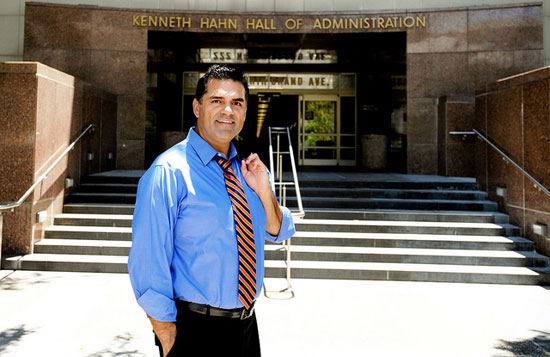Board orders audit of assessor’s office
April 10, 2012

Assessor John R. Noguez blames a surprise drop in property prices for the differences in his forecasts.
Los Angeles County’s assessor came under tough criticism from the Board of Supervisors on Tuesday for producing alarmingly divergent property tax forecasts that could create unexpected headaches for hard-pressed municipalities, school districts and public safety agencies that rely on the funding.
“It’s perplexing, it’s confounding and it’s unprecedented in my time here,” said board Chairman Zev Yaroslavsky, who, with Supervisor Mark Ridley-Thomas, authored a unanimously approved motion ordering an immediate top-to-bottom audit of the assessor’s office.
Assessor John R. Noguez had disclosed to supervisors last week that the county’s 2012-2013 property tax roll would likely generate only a fraction of the net increase he’d forecasted in December, dropping from $18 billion to just $5 billion. On Tuesday, testifying before the board, Noguez blamed the disparity on what he said was a surprising plunge in property values during the final months of last year, with an average 5% tax reduction expected on more than 500,000 parcels.
But Noguez’s explanations, along with those of his chief of staff, seemed only to fuel the supervisors’ concerns about the performance of the assessor’s office, which in recent months has been confronted with allegations that it gave special treatment to certain property owners. Noguez, a 25-year veteran of the assessor’s office who was elected to the top job in 2010, has insisted he’s acted properly and said Tuesday he welcomes a comprehensive review of his office by the county’s auditor-controller.
During the board meeting, Noguez was not asked directly about that controversy. But the tenor of the questioning—and the wording of the audit motion itself—suggested that the supervisors had broader concerns than the revenue forecasts.
“It is imperative that the Board of Supervisors, the governing bodies of other local public agencies and the public have confidence in the Assessor to accurately, efficiently and impartially administer the property assessment process,” Yaroslavsky and Ridley-Thomas wrote in their motion. “The public must be ensured that adequate controls are in place to safeguard the reliability and integrity of the system.”
Although it’s not unusual for variations to exist among property tax forecasts, what made this one so “shocking,” in the words of Supervisor Don Knabe, was that differences between the projected revenue increases were so big—from 1.77% in December to .49% this month. For the county, that represents a potential drop of more than $50 million at a time when the county and other municipalities are hammering out their budgets.
“It’s not simply a matter of numbers but, in fact, real impacts that could adversely affect real human beings,” Ridley-Thomas said.
Chief Executive Officer William T Fujioka, who called the size of the disparities “unprecedented,” said the new audit could show that the assessor’s office got it wrong and that the spread is smaller than currently predicted. “I’m confident [that] through the auditor-controller’s efforts that we’ll get a more accurate picture,” he said.
If the $50 million drop in revenue should hold true, Fujioka said, “I’m confident we’ll be able to address this without any significant reduction in county services.”
That may not be the case elsewhere, as Supervisor Michael D. Antonovich pointedly noted. “This,” he said, “is going to be a severe tsunami to the schools and cities.”
The city of Los Angeles’ chief budget official, Miguel Santana, said in an interview that the difference in forecasts means a potential loss of more than $18 million—“a significant change in terms of how tight our budget is…We’re trying to find solutions to mitigate that gap.” The city is confronting a budget deficit of $222 million.
Santana, like L.A. County officials, said he learned belatedly about that gap only after contacting Noguez for an update. Veterans of the city’s budget office, he said, were stunned by the sharp variances between the earlier and latest forecast. “This is the first time they’ve seen anything so dramatically different.”
Posted 4/10/12












 405 bridge work causes a stink
405 bridge work causes a stink
